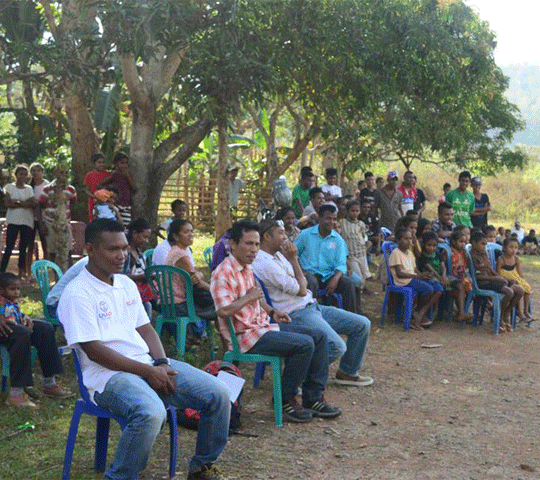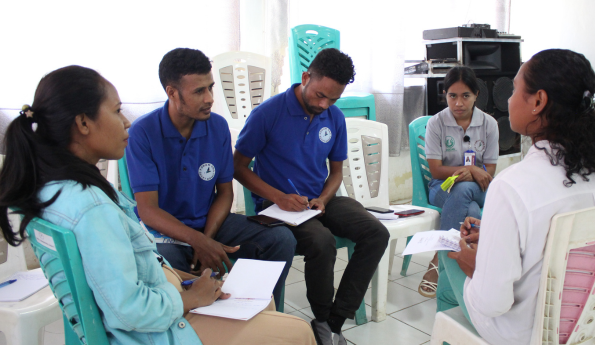Access to clean water is essential for sustainable development and a top priority in low-income countries. Initiatives aimed at improving water and sanitation must involve the local community and include input from women, people with disabilities, and other underrepresented groups. Counterpart’s NGO Advocacy for Good Governance Activity, funded by USAID, assists local civil society organizations such as Fundasaun Hafoun Timor–Lorosa’e (FHTL) in their efforts to secure sustainable and equitable access to clean water.
Jesuinha da Cunha Lopes, a civil engineer by training, is a program manager at FHTL, responsible for the working with local communities to help establish access to water systems and improve hygiene. Lopes leads technical staff on the implementation of activities, supports the director on donor outreach, and leads advocacy efforts around improved access to clean water and better sanitation and hygiene. She is also responsible for leading coalition building and joint advocacy efforts for water access.
To sharpen her skills, Lopes attended a series of Counterpart trainings on advocacy, research, leadership, proposal writing, coalition building, and joint advocacy. Lopes admits that her knowledge of advocacy was limited, particularly in how to build coalitions. Since the training, she has increased her understanding of advocacy, resulting in more effective implementation. Now, she is able to better support local stakeholders to work together to provide strong research-based evidence to convince policy makers of the need to support clean water and improved WASH.
FHTL implements water and sanitation programs at the community level, advocates for water and sanitation programs at the national level, and encourages communities to voice their needs regarding improved water and sanitation services. In their work with local communities, FHTL found that citizens often struggled to find a way to bring their concerns to the government representatives necessary to solve their problems. Counterpart helped enable FHTL and staff like Lopes to realize that forming citizen coalitions was one way that they could present a unified front and get heard by critical members of the government so that they could work together to bring water to the local communities that need it most.

Lopes leading an advocacy session for a community 2.5 hours outside Dili to ensure they are ready to set up and maintain new water access points.
Currently, Lopes is leading a joint coalition of FHTL and Programa Spesifiku fo Prioridade ba Ema Kiak, an organization based in the eastern part of the country dedicated to supporting rural development and good governance. This joint advocacy initiative provides a forum for civil society to communicate with policy makers around the need to revise a law on water distribution and public consumption. Their aim is to include a plan for developing the capacity of local partners and re-allocating resources. Using the skills she learned in the training, Lopes recruited 14 local organizations to join the coalition, including NGOs based in Lospalos, a town approximately 250 kilometers outside of Dili, where the rest of the coalition is based. It is critical that key government stakeholders—including the secretaries of state for water and electricity and for forestry—hear directly from the community. With support from Lopes and FHTL, the coalition recently hosted a forum with the government in which they provided insights and recommendations on water issues that the community, with a particular emphasis on how women and people with disabilities are impacted by water-related projects. When the politicians and stakeholders saw the wide-ranging support enjoyed by the coalition, they were ready to listen and help.

FHTL brought together the community of Maubisse, Timor-Leste to get their buy in and support around maintaining new water access points for the local village.
“Being a woman leading a team made up of majority men is quite challenging because of cultural norms in our society,” Lopez observed. “However, from trainings and practices that we had, I felt I am able to lead them and they trust me.” She added, “As an organization, I see that FHTL has achieved significant success through its partnership with the USAID/Timor-Leste NGO Advocacy for Good Governance Activity, which has brought about transformative changes in FHTL’s advocacy efforts and organizational practices.” FHTL staff now that coming together in a coalition makes a greater impact on government representatives. Together, they are better positioned to advocate for improved clean water for all.




